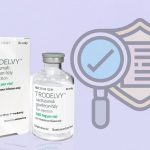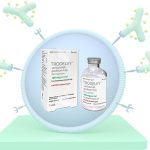The breast contains 12 to 20 sections, known as lobes, and each lobe is made up of smaller sections called lobules. These sections are composed of fat and fibrous tissue, connected by thin ducts leading to the nipples. Breast cancer begins when cells in the breast grow uncontrollably, forming a tumor. Tumors can either be malignant (cancerous) or benign (non-cancerous).
HR+ (hormone receptor-positive) breast cancer means the tumor cells have receptors for hormones like estrogen or progesterone, which promote their growth. HER2- (human epidermal growth factor receptor 2-negative) breast cancer means that the tumor cells contain little to no HER2 protein, leading to a slower growth rate compared to HER2-positive cancers.
Globally, HR+/HER2- metastatic breast cancer is the most common subtype, with an age-adjusted rate of 87.4 new cases per 100,000 women between 2015 to 2019. In India, breast cancer is also the most prevalent cancer among women, with HR+/HER2- cases increasing steadily. Around 40% of breast cancer cases in India are HR+/HER2-.
About 50% of metastatic breast cancer cases are HR+/HER2-, and 70% of the time, this cancer spreads to the bones. It can also affect other areas such as lymph nodes, the liver, and the lungs.
New Treatment Approved for HR+/HER2- Metastatic Breast Cancer:
On February 3, 2023, the FDA approved Trodelvy (sacituzumab govitecan-hziy) for treating adults with locally advanced or metastatic HR+/HER2- breast cancer. This approval applies to patients who have already undergone endocrine-based therapy and at least two additional treatments.
Trodelvy is administered through an IV infusion at a dose of 10 mg/kg, given once a week on Days 1 and 8 of a 21-day treatment cycle. Treatment continues until there is evidence that the disease progresses or the patient experiences intolerable side effects.
Common side effects of Trodelvy include diarrhea, nausea, fatigue, hair loss, reduced white blood cell counts, and elevated blood sugar levels.
About Trodelvy (Sacituzumab Govitecan-hziy):
Trodelvy is a first-in-class antibody-drug conjugate (ADC) that targets Trop-2, a protein found in more than 90% of breast and bladder cancers. This drug delivers chemotherapy directly to cancer cells, minimizing damage to healthy cells.
Trodelvy is approved in over 40 countries and is undergoing further reviews in various regions. Aside from treating HR+/HER2- breast cancer, it is also used for treating triple-negative breast cancer (mTNBC) and metastatic urothelial cancer (mUC).
Accessing Trodelvy Legally:
If Trodelvy is not available in your country, you can order it from us. We specialize in providing affordable access to difficult-to-obtain medications. To buy Trodelvy in India, contact us via Call/WhatsApp at +91 9310090915 or dial our TOLL-FREE: 1800-889-1064. We ensure fast, reliable delivery of this life-saving medication.
FAQs:
What is HR+/HER2- metastatic breast cancer?
HR+/HER2- metastatic breast cancer is a subtype where tumor cells have hormone receptors (HR+) but lack significant amounts of the HER2 protein (HER2-). It is the most common type of breast cancer and frequently spreads to bones and other organs.
How does Trodelvy work for HR+/HER2- metastatic breast cancer?
Trodelvy is an antibody-drug conjugate (ADC) that targets Trop-2 proteins in cancer cells. It carries chemotherapy directly to these cells, reducing harm to healthy tissue and effectively slowing cancer progression.
Is Trodelvy available in India?
Yes, Trodelvy can be made available in India through specialized suppliers like the Indian Pharma Network (IPN). If it is not readily accessible, we can help you obtain it at an affordable price. Contact us for details.
Can HR+/HER2- metastatic breast cancer be cured?
While HR+/HER2- metastatic breast cancer is generally not curable, treatments like Trodelvy can significantly slow the disease’s progression, offering patients better quality of life and longer survival.
How can I buy Trodelvy in India?
Indian Pharma Network (IPN) can help facilitate the supply of Trodelvy in India and other countries where the drug is unavailable. Contact us via Call/WhatsApp: +91 9310090915 to buy Trodelvy in India.
Conclusion:
Trodelvy represents a breakthrough in the treatment of HR+/HER2- metastatic breast cancer, offering new hope to patients who have exhausted other therapies. By directly targeting Trop-2 proteins, this therapy provides a more precise and effective treatment option. If you or someone you know is seeking advanced treatment options for breast cancer, buy Trodelvy through our services.






